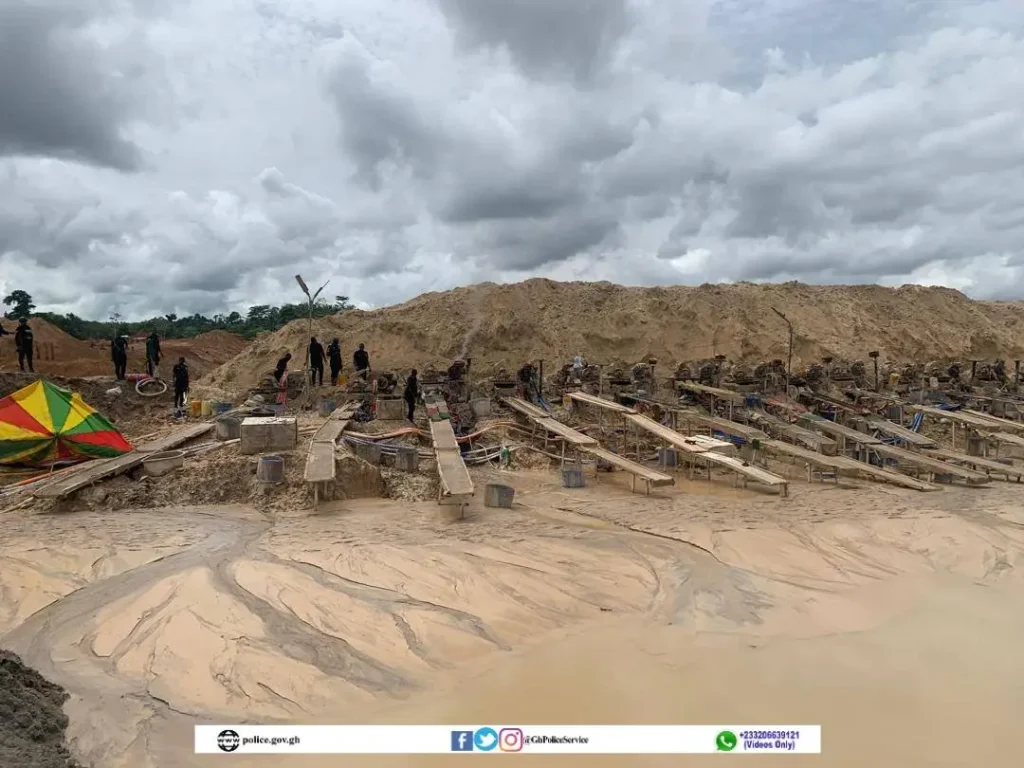The Western Central Regional Police Command launched a successful operation against illegal mining, or “galamsey,” in Wassa Gyapa, Western Region, on May 19, 2025. This operation resulted in the arrest of thirteen individuals suspected of engaging in illicit mining activities. The police also disabled over 120 changfang machines, specialized equipment used in the illegal processing of gold ore, effectively disrupting the operation. Six motorbikes were also confiscated from the site, likely used for transport and logistical support. The arrested individuals, including Nana Ampadu, Stephen Tetteh, Yaw Dalame, Samuel Amoah, Kwame Oppong, Francis Oduom, Owusu Asare, Atta Kwame, Apiyanga Emmanuel, Kojo Montanakito, Maxwell Owusu, Obofo Vincent, and Soogal Fataw, are scheduled to appear before the Tarkwa Circuit Court on May 20, 2025, to face charges related to their alleged involvement in illegal mining. This operation underscores the ongoing efforts of law enforcement agencies to combat the detrimental environmental and social impacts of galamsey.
This recent operation in Wassa Gyapa forms part of a larger crackdown on illegal mining activities across Ghana, spearheaded by the Ghana Police Service. The increased enforcement reflects a growing national concern about the devastating consequences of galamsey, including widespread deforestation, water pollution, and the destruction of arable land. The illegal mining operations often employ rudimentary and hazardous methods, posing significant risks to the environment and the health of communities in affected areas. The use of chemicals like mercury in the gold extraction process further contaminates water sources and poses serious health hazards to both miners and local populations. The Ghana Police Service, under the leadership of Inspector General of Police Christian Tetteh Yohuno, has demonstrated a commitment to dismantling these illegal operations and bringing perpetrators to justice.
Just days prior to the Wassa Gyapa operation, on May 15, 2025, the Eastern South Regional Police Command conducted a similar operation in Akyem Muoso, Eastern Region. Fourteen individuals were arrested in connection with illegal mining activities in the area. The suspects were subsequently arraigned before the Koforidua Circuit Court B on May 16, 2025, and were each granted bail of GHC350,000.00, with conditions requiring two sureties, one of whom must provide movable property as security. In addition to the arrests, the police seized a pump-action gun from one of the suspects, Zuberu Nuhoho, who failed to produce the necessary documentation for possessing the firearm. Two excavator control boards were also confiscated from the mining site, indicating the scale of the illegal operation.
These back-to-back operations signify a concerted effort by Ghanaian authorities to curb the pervasive issue of illegal mining. The arrests and seizures represent a significant step towards disrupting the networks involved in galamsey and holding individuals accountable for their actions. The consistent action taken by different regional police commands highlights the nationwide scope of the problem and the collaborative approach being taken to address it. The imposition of substantial bail amounts further emphasizes the seriousness with which the authorities are treating these offenses. The ongoing efforts aim to deter future illegal mining activities and protect the country’s natural resources.
The fight against galamsey is not solely a law enforcement endeavor. The Ghanaian government has implemented various initiatives to tackle the issue from multiple angles. One such initiative is the deployment of the Blue Water Guards, a specialized unit trained to protect the nation’s water bodies from the destructive effects of illegal mining. The Blue Water Guards play a crucial role in monitoring water bodies, preventing illegal mining activities along riverbanks and shorelines, and reporting any violations to the relevant authorities. Their presence acts as a deterrent and helps to safeguard vital water resources from further contamination.
The combined efforts of law enforcement agencies, government initiatives, and public awareness campaigns are crucial for combating the complex challenge of illegal mining in Ghana. The arrests in Wassa Gyapa and Akyem Muoso represent tangible progress in this ongoing fight. However, the scale and complexity of the problem require sustained and multifaceted interventions to effectively address the root causes of galamsey and mitigate its devastating consequences. These interventions must include not only enforcement actions but also alternative livelihood programs for those involved in illegal mining, community engagement, and educational initiatives to raise awareness about the detrimental impacts of galamsey. The continued collaboration between government agencies, local communities, and international partners will be essential to achieving long-term success in eradicating illegal mining and safeguarding Ghana’s environment and natural resources.














